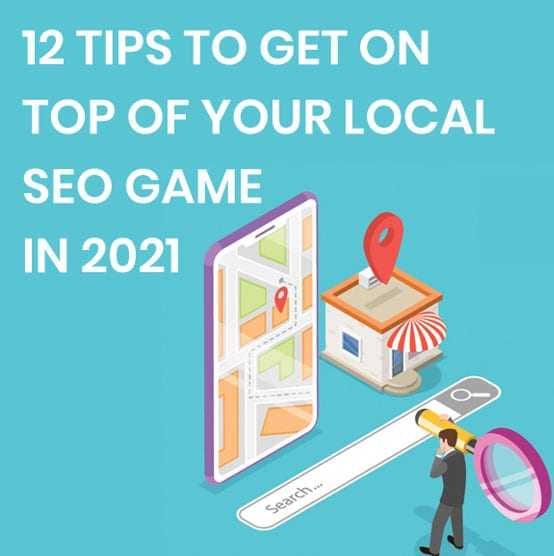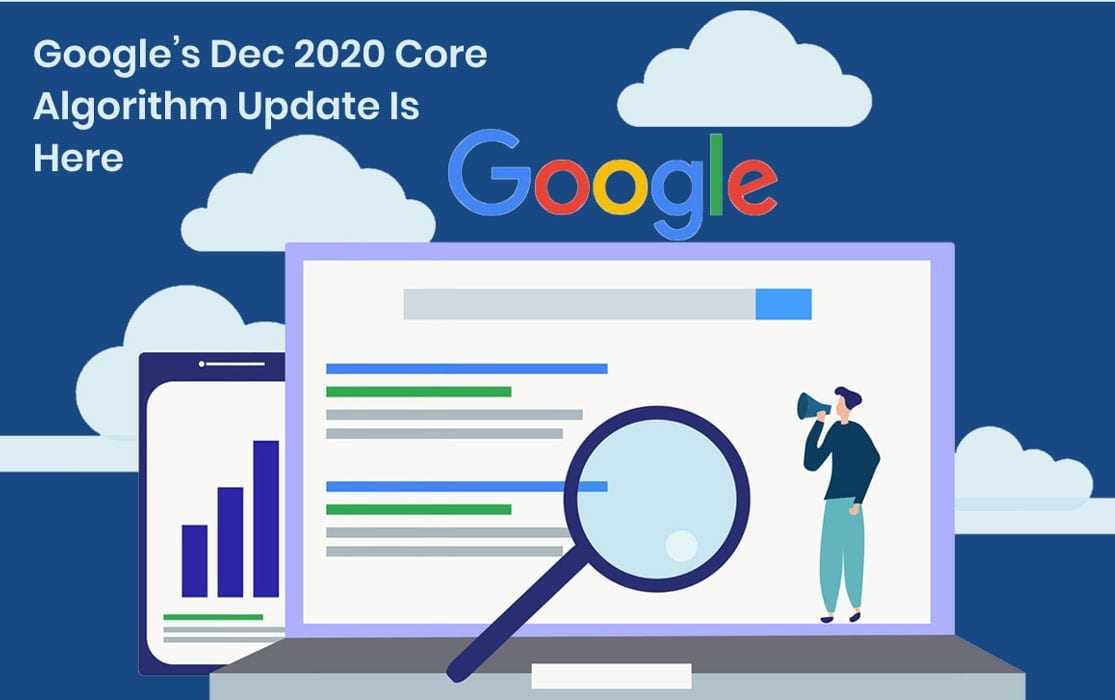GOOGLE’S DEC 2020 CORE ALGORITHM UPDATE IS HERE
On Dec 3rd, 2020, Google began rolling out a new core algorithm update, and as always it made some people happy, while others weren’t as pleased about it.
Google keeps making smaller modifications to its ranking formulas almost every day, but the big changes are made only about three times annually. This is also the reason why the recent change was anxiously anticipated since May 2020, when the last one took place.
Like always, Google responded to queries and comments by referring to their boilerplate recommendations of the past like what webmasters should know about Google’s core updates and the 175-page general guidelines for search quality evaluators.
Simply put, Google reflected their casual, don’t worry if you lost rankings attitude by saying…
“pages that drop after a core update don’t have anything wrong to fix.”
But, if you still feel you need to do something, try “focusing on ensuring you’re offering the best content you can”. The same old line that they use whenever they are asked about getting your page ranked.
What Can Be Done
Even if your rankings have tanked as a result of the last core update, there are no specific actions that you can take to recover, says Google. They also went on to say that negative rankings do not mean there is anything wrong with your pages. That said, we haven’t noticed any rank drop for our clients due to this update.
Google does suggest a list of questions to consider, based on different categories.
Content and Quality Questions
- Does the content provide original information, reporting, research or analysis?
- Does the content provide a substantial, complete or comprehensive description of the topic?
- Does the content provide insightful analysis or interesting information that is beyond obvious?
- If the content draws on other sources, does it avoid simply copying or rewriting from those sources and instead provide substantial additional value and originality?
Expertise Questions
- Does the content present information in a way that makes you want to trust it, such as clear sourcing, evidence of the expertise involved, background about the author, or the site that publishes it through links to an author page or a site’s About page?
Presentation and Production Questions
- Does content display well for mobile devices when viewed on them?
You might also want to have a go through this article comparing rank volatility and average position change. It also lists winners and losers!
INSIGHTS INTO SOME SEO TRENDS FOR 2021

Staying updated with the latest Search Engine Optimization (SEO) related developments is important to increase your website’s traffic. It can be a bit demanding, but it is worth your efforts.
To help you stay informed and prepared for the upcoming digital challenges, we have prepared a list of some SEO trends to look out for this year. These trends can be your flashlights on your way to SEO success.
Here’s a quick rundown of the most relevant SEO Trends:
Artificial Intelligence Will Decide The Rankings
- RankBrain, Google’s AI algorithm, is an important factor to rank in SERPs. There is no specific information on how RankBrain functions. It is said to help Google interpret queries by finding pages that are relevant but may not have the exact keywords used in the queries. One of the best ways to optimize your SEO for RankBrain is by organizing the content on your page.
- BERT was rolled out in Google’s search system in October 2019 for English-language queries. BERT algorithm will help Google better understand the intent behind users’ search queries. It aims to provide relevant results by understanding natural language. BERT will impact 10% of searches, so there are chances it will also affect your brand’s visibility. Again, great content will be rewarded!
- Discover, Google’s AI-driven tool identifies user behavioral patterns & gradually learns these habits. The information collected is used to find the most accurate content that the users will be interested in. Wondering what you can do? Nothing! If Google indexes your page, your content is included.
The Shift To Mobile-First Indexing
- Almost 70% of the sites shown in Google’s search results have shifted to mobile-first indexing. From September 2020, Google has officially switched to mobile-first indexing. To ensure your web page is mobile-friendly, use the Mobile-Friendly Test Tool offered by Google.
Content Strategy Tips
- Wish to create quality content for your business? Follow the EAT principle (expertise, authoritativeness, and trustworthiness) while you craft your content strategy. It helps to build a positive online presence and ensures that the user is protected from fraud & low-quality content.
- To rank higher in Google & to keep your users engaged, we recommend focusing on quality long-form content (3000+ words). Steps to create engaging long-form content includes breaking the content into sections, adding headings and sub-headings, researching the topic in-depth, creating a content outline, etc.
Local SEO Gains Importance
- Local SEO is evolving rapidly due to the rise of zero-click searches. Zero-click searches are results that are shown at the top of Google’s first page so that the user doesn’t have to open a link. Wish to get started with local SEO? Create a GMB (Google My Business) page!
- A Featured Snippet aims to answer a search query & is located at or near the top of a Google SERP. It is a great way to reach the first page of search results. Having a presence inside the PAA (People Also Ask) box is also an effective way to rank on the first page of the search results.
Focus On User Search Intent
- Semantic Search is gradually gaining importance because Google now analyzes the query context and tries to understand a user’s search intent to provide more relevant information. Wish to deal with Semantic Search? Create content that answers a question that your potential customers would pose.
- Google urges proper labeling & optimization of images. It is the right time to optimize or recheck the images on your website. We recommend using good quality & relevant images. Also, customize the file name & label the photos properly so that the displayed images are in-line with the content on the page.
Other Ways To Optimize Keywords
- Voice Search Technology is popular enough to consider it an important ranking factor. Using the keywords that consumers use regularly for voice search can be useful to drive traffic to your site.
- YouTube has millions of users. You must create video content to reach out to your potential customers. To get started, type your video’s topic and study the results that appear. This will give you a list of keywords and tell you precisely what people on YouTube are looking for.
Be Data-Driven
- Data science helps you to understand buyers and create targeted messages. Analytics can help you verify which URLs are getting crawled, check page loading time, indexing, response errors, and more. Staying updated with the data and analytics related to your business gives you an edge over your competitors.
The right SEO tools can guide you to prepare a smart SEO strategy & help you stay on top of the rankings. If you are on the lookout for SEO on your own website or your clients, we can be the right fit. Just connect with us and our experts will assist you further.
12 TIPS TO GET ON TOP OF YOUR LOCAL SEO GAME IN 2021

Did you know, around 28% of all local searches typically result in a purchase? Recent times have shown us just how important it is for a business to have a solid online presence. In order to establish that presence, a business needs to succeed at both, overall SEO and local SEO. The combination of a strong traditional and local SEO strategy can help propel your business way ahead of your competition.
To effectively harness the power of local search, you need to first understand how to build and implement a good local SEO strategy. Read on to find the top 12 local SEO tips that can help improve your business’s online presence in 2021.
#1. Do not delay in creating a GMB listing
Creating a GMB listing is not very difficult. Just ensure that you complete your profile and list all your products and services. Once you are done setting up your GMB listing, start creating mini-posts for your clients using the Google Posts feature. This will not only help you keep your clients updated, but it will also show Google that you are taking the time to manage your listing.
#2. Get your business listed in other important directories as well
Listing your business on all the important online directories is essential for local SEO. Check whether there are any online business directories specific to your area and target them along with the main national and global directories, such as:
• Yelp
• FourSquare
• Angie’s List
• Bing Places
• HotFrog
• Best of the Web
• About Us
#3. Ensure your Name and Place (NAP) information is updated and correct
Incorrect and inconsistent NAP information generally results in Google not displaying your GMB listing. So make sure your NAP information is correct and completely the same across all the platforms and in all your listings.
In case your business moves to a new location, update this information on all platforms as soon as possible. Also, since a business’s profile information can now be updated based on changes suggested by consumers, you should keep a close eye on it to ensure there are no discrepancies.
#4. Find out the local keywords you can target
Targeting local keywords is an absolute must when it comes to local SEO. Make sure your research for local keywords includes longer tail keywords related to your business as well as variations of search terms. You might also want to look into targeting hyper-local keywords.
#5. See to it that your site is optimized with the local keywords
Once you are done shortlisting the local keywords you would like to rank for, optimize your site using these keywords. The keywords must feature on your homepage as well as your service pages in the following areas:
• Headings
• Title Tags
• Meta Descriptions
• Body
• Footer
If possible, try and incorporate your main local keyword in the URL as well. Just make sure that when you add these keywords, you incorporate them into the rest of the content as naturally as possible.
#6. Create locally relevant content
Creating non-local content for a locally focused business will do you no good. For better lead generation, you need to create content that is locally relevant. The best way to go about it would be by incorporating local keywords into content related to the products and/or services you offer. You can also come up with content that revolves around local news and events related to your business or industry.
#7. Make your site mobile-friendly Statistics show that of all the mobile searches conducted, 30% are location-related. This makes it extremely important to ensure that your site is mobile-friendly. If your site fails to work properly on mobile, there are high chances that you might lose quite a few of your potential consumers to a competitor whose website is easy to access even on mobile. Make sure you do not lose them by optimizing your site for mobile.
#8. Optimize your site for voice as well
Mobile voice searches are now starting to become a common practice among consumers. It has come to light that mobile voice searches are 3X more likely to be related to something local as compared to text searches. However, voice search is still relatively new, and many businesses are yet to capitalize on it. Hence, optimizing your site and content for voice now will help you stay ahead of your competitors.
#9. Always look for opportunities to build inbound links
Building inbound links can strengthen not only your overall SEO efforts but also your local SEO game. While there are many ways to build quality inbound links, one of the most effective ways is to connect with those people and businesses that are related to your industry and figure out a way to place a contextual link on their websites.
#10. If you serve multiple locations, create location pages
If your business serves multiple locations, you will want your website to rank in the local searches for each of those locations. The best way to do so is by creating a separate page for every location, instead of just listing them down on one page. Besides creating unique content for every page, you will have to ensure that they are optimized for local keywords.
#11. Take the time to manage your reviews
Managing your reviews is an absolute must for succeeding in local SEO in 2021. Getting good reviews is great, but the negative ones can severely impact your authority and your rankings. The best way to manage your negative reviews is to respond to them with an aim to resolve the issues raised. This will not only help you retain customers, but it will also show Google that you are actively working to enhance customer experience. Hence, it is crucial that you manage your reviews across all platforms and listings.
#12. Don’t forget to pay attention to your overall SEO
While local SEO is important, especially for the locally-focused businesses, that’s no reason to ignore overall SEO. Google has made it very clear that organic SERP plays a major role in improving your local rankings. Chances are high that if you ignore implementing certain very important traditional SEO components, your local SEO efforts may fail as well. So make sure you keep a close eye on that front.
Final Takeaway The year 2020 played a huge role in the colossal move of the majority of the consumers and the smallest of businesses online. Even if you may have already implemented some of the above listed local SEO tips, a lot more goes into building a comprehensive SEO strategy. If you find that your business is still floundering in the digital world, then it’s high time you get in touch with a reliable SEO expert to help you catch up to your competition.


![What is Context Marketing? Why It Matters in 2022 [+Examples]](https://b2346413.smushcdn.com/2346413/wp-content/uploads/2022/03/context-marketing.jpeg?lossy=1&strip=1&webp=1)



